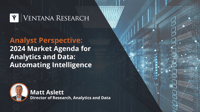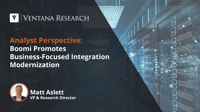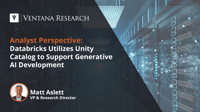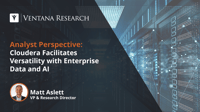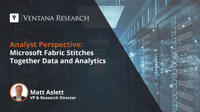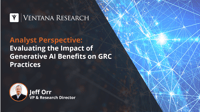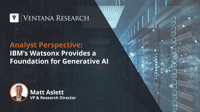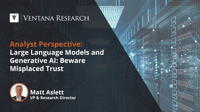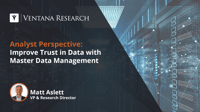Ventana Research recently announced its 2024 Market Agenda for Analytics and Data, continuing the guidance we have offered for two decades to help enterprises derive optimal value and improve business outcomes.
Read More
Topics:
embedded analytics,
Business Intelligence,
Data Governance,
Data Management,
natural language processing,
data operations,
Process Mining,
Streaming Analytics,
Analytics & Data,
Streaming Data & Events,
operational data platforms,
Analytic Data Platforms,
AI and Machine Learning
I recently articulated some of the reasons why IT teams can fail to deliver on the business requirements for data and analytics projects. This is an age-old and multifaceted problem that is not easily solved. Organizations have a role to play in alleviating the issue by ensuring that their business processes and project planning support a collaborative approach in which business and IT professionals work together. Data and analytics product vendors can also help by delivering products that are...
Read More
Topics:
Cloud Computing,
Data Governance,
Data Management,
Data,
Digital Technology,
Analytics & Data,
AI and Machine Learning
I previously described how Databricks had positioned its Lakehouse Platform as the basis for data engineering, data science and data warehousing. The lakehouse design pattern provides a flexible environment for storing and processing data from multiple enterprise applications and workloads for multiple use cases. I assert that by 2025, 8 in 10 current data lake adopters will invest in data lakehouse architecture to improve the business value generated from the accumulated data.
Read More
Topics:
Analytics,
Business Intelligence,
Data Governance,
Data Management,
Data,
Digital Technology,
Analytics & Data,
Analytic Data Platforms,
AI and Machine Learning
The data platforms market may appear to have little or nothing to do with haute couture, but it is one of the data sectors most strongly influenced by the fickle finger of fashion. In recent years, various architectural approaches to data storage and processing have enjoyed a phase in the limelight, including data warehouse, data mart, data hub, data lake, cloud data warehouse, object storage, data lakehouse, data fabric and data mesh. These approaches are often heralded as the next big thing,...
Read More
Topics:
Cloud Computing,
Data Governance,
Data Management,
Data,
Digital Technology,
data operations,
Analytics & Data,
Streaming Data & Events,
operational data platforms,
Analytic Data Platforms,
AI and Machine Learning
I have written before about the rising popularity of the data fabric approach for managing and governing data spread across distributed environments comprised of multiple data centers, systems and applications. I assert that by 2025, more than 6 in 10 organizations will adopt data fabric technologies to facilitate the management and processing of data across multiple data platforms and cloud environments. The data fabric approach is also proving attractive to vendors, including Microsoft, as a...
Read More
Topics:
Analytics,
Business Intelligence,
Cloud Computing,
Data Governance,
Data Management,
Data,
Digital Technology,
Analytics & Data,
Analytic Data Platforms,
AI and Machine Learning
I recently wrote about the various technologies used by organizations to process and analyze data in real time. I explained that while the terms streaming data and events and streaming analytics are often used interchangeably, they are separate disciplines that make use of common underlying concepts and technologies such as events, event brokers and event-driven architecture. Confluent’s acquisition of Immerok earlier this year provided a reminder of this fact. Confluent is one of the most...
Read More
Topics:
Analytics,
Cloud Computing,
Data Governance,
Data,
Digital Technology,
Streaming Analytics,
Streaming Data & Events
Governance, risk management and compliance are essential tactics for a successful organization. Effective GRC practices help organizations achieve business objectives, mitigate risks and ensure compliance with laws and regulations. As a chief information officer or IT leader, it is important to evaluate new technologies and determine their impact on the business, including whether they fit within the scope of current GRC programs and processes.
Read More
Topics:
Data Governance,
Digital Business,
Digital Security,
Governance & Risk,
AI and Machine Learning
It is a mark of the rapid, current pace of development in artificial intelligence (AI) that machine learning (ML) models, until recently considered state of the art, are now routinely being referred to by developers and vendors as “traditional.” Generative AI, and large language models (LLMs) in particular, have taken the AI world by storm in the past year, automating and accelerating the development of content, including text, digital images, audio and video, as well as computer programs and...
Read More
Topics:
Analytics,
Business Intelligence,
Cloud Computing,
Data Governance,
Data,
Digital Technology,
natural language processing,
AI & Machine Learning,
Analytics & Data,
Analytic Data Platforms
The data and analytics sector rightly places great importance on data quality: Almost two-thirds (64%) of participants in Ventana Research’s Analytics and Data Benchmark Research cite reviewing data for quality and consistency issues as the most time-consuming task in analyzing data. Data and analytics vendors would not recommend that customers use tools known to have data quality problems. It is somewhat surprising, therefore, that data and analytics vendors are rushing to encourage customers...
Read More
Topics:
Analytics,
Data Governance,
Data Management,
Data,
Digital Technology,
natural language processing,
AI & Machine Learning,
Analytics & Data
Master data management may not attract the same level of excitement as fashionable topics such as DataOps or Data Platforms, but it remains one of the most significant aspects of an organization’s strategic approach to data management. Having trust in data is critical to the ability of an organization to make data-driven business decisions. Along with data quality, MDM enables organizations to ensure data is accurate, complete and consistent to fulfill operational business objectives.
Read More
Topics:
Data Governance,
Data Management,
Data,
data operations
